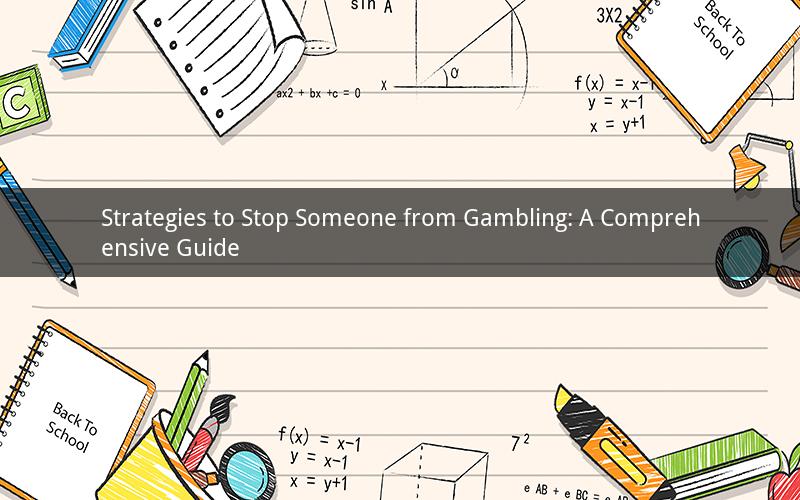
Gambling can be an addiction that ruins lives, leaving those affected in a web of financial, emotional, and social distress. If you know someone struggling with gambling, it's important to understand the challenges they face and how to help them break free from this destructive habit. In this article, we'll explore various strategies to stop someone from gambling and provide insights into the recovery process.
1. Recognize the Problem
Identifying a gambling addiction is the first step towards helping someone overcome it. Look for signs such as secretive behavior, financial problems, neglecting responsibilities, and an increasing need to gamble to support your loved one's habit.
2. Encourage Open Communication
Establishing a strong, open line of communication with the gambler is crucial. Listen to their struggles without judgment, and offer empathy and support. Encourage them to share their feelings and thoughts about their gambling addiction, and assure them that they're not alone.
3. Support Their Decision to Stop Gambling
When the gambler is ready to quit, provide them with unwavering support. Encourage them to make a firm decision to stop gambling and help them develop a plan to achieve their goal. This may include seeking professional help, attending support groups, or joining a gambling anonymous program.
4. Set Clear Boundaries
To prevent your loved one from relapsing, it's essential to set clear boundaries. This may involve limiting contact with gambling-related environments, avoiding arguments about gambling, and enforcing financial restrictions.
5. Provide Alternatives
Finding alternative activities to fill the void left by gambling can help the gambler rebuild their life. Encourage them to engage in hobbies, join clubs, or attend social events to distract themselves from the urge to gamble.
6. Seek Professional Help
Professional intervention can significantly increase the chances of recovery. A therapist or counselor can help the gambler understand the roots of their addiction, develop coping mechanisms, and address any underlying mental health issues.
7. Be Patient and Understanding
Recovery from a gambling addiction is a long, challenging process. It's important to be patient and understanding as your loved one faces setbacks. Encourage them to keep moving forward, and celebrate their small victories along the way.
8. Support Financial Recovery
Gambling addiction often leads to severe financial problems. Help your loved one by offering financial guidance, such as budgeting advice or assistance in seeking debt relief programs. Be prepared to stand by them as they rebuild their financial stability.
9. Stay Involved in Their Recovery
Continuing to support your loved one as they progress through their recovery journey is vital. Attend support group meetings, therapy sessions, and other activities related to their recovery. This demonstrates your commitment to their success and provides them with a sense of accountability.
10. Take Care of Yourself
While supporting someone with a gambling addiction is an act of love, it's also essential to take care of your own well-being. Seek support from friends, family, or professionals to manage your emotions and maintain your own mental health.
Q1: What are the warning signs of a gambling addiction?
A1: Warning signs of a gambling addiction include secretive behavior, financial problems, neglecting responsibilities, an increasing need to gamble, and the development of withdrawal symptoms when unable to gamble.
Q2: How can I encourage someone to seek help for their gambling addiction?
A2: Encourage your loved one to seek help by expressing concern for their well-being, sharing your fears, and offering to help them find appropriate resources. Avoid being confrontational or judgmental, as this may push them further away.
Q3: Are there support groups available for those struggling with gambling addiction?
A3: Yes, there are several support groups available, such as Gamblers Anonymous and Gambler's Help. These groups provide a safe, supportive environment for individuals to share their experiences and learn from others who have faced similar challenges.
Q4: Can therapy help someone overcome a gambling addiction?
A4: Yes, therapy can be highly effective in helping individuals overcome a gambling addiction. Therapists can help the gambler understand the underlying causes of their addiction, develop coping mechanisms, and address any co-occurring mental health issues.
Q5: How can I support a friend or family member who has quit gambling?
A5: Support a friend or family member who has quit gambling by being patient, understanding, and encouraging. Offer to attend meetings or events with them, provide emotional support, and celebrate their progress and milestones along the way.